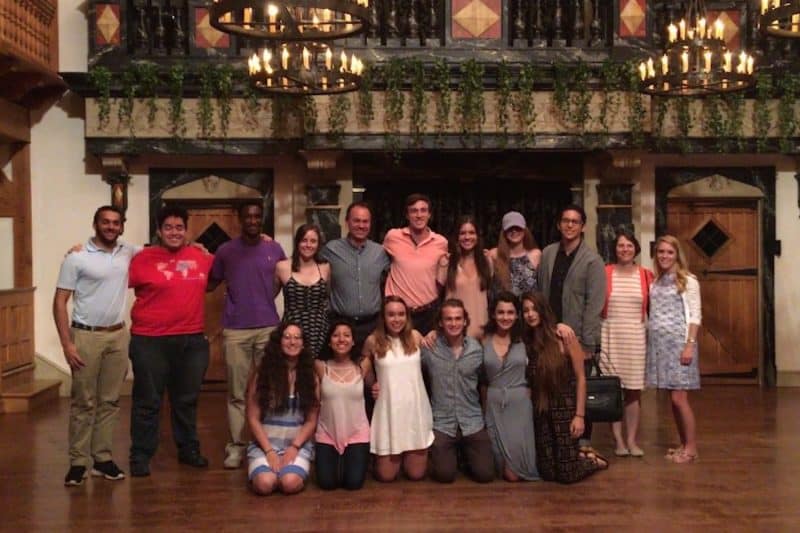Advanced Research Cohort Program Marks Second Successful Year Twelve Class of 2021 students visited W&L for a five-week Advanced Research Cohort program that allowed them to dabble in STEM projects and establish quality relationships.
A dozen members of Washington and Lee University’s Class of 2021 spent five weeks on campus this summer as part of the Advanced Research Cohort (ARC) Program. The program, which was piloted during summer 2016, gave a diverse group of students the chance to work with faculty and current students on existing research, develop and execute their own STEM-related projects, and build relationships with each other and the W&L community that will endure throughout their college careers.
The ARC program, which started with the seed of an idea from biology professor Helen I’Anson, focuses on incoming students who already have a strong interest in science, technology, engineering and math. This year’s program built on the success of the inaugural year, adding longer stretches of time in the laboratory and fine-tuning enrichment programs in leadership and career development.
Each of the 12 students was assigned a professor/mentor and was able to assist that professor on her or his current research project. That included working with summer research assistants in the laboratory for both full and half-days. The ARC students also broke into small groups to develop their own STEM-related projects.
This year’s projects included a 3D-printed model of Lee Chapel, for which students used a drone to take hundreds of pictures and generate a virtual model. Another group wrote the computer code for a robot that can move around without running into objects. A third team used piezoelectric transducers in shoe inserts to turn mechanical energy into electrical energy, while a fourth made a virtual reality simulation of a Mars mission in the hopes that it might someday turn into a full video game.
Megan Hobbs, assistant dean of students and dean of sophomores, joined the ARC students to talk about leadership development and self-awareness, while Assistant Director for STEM Programs Molly Steele organized professional development events with alumni speakers. Steele also worked with the participants to establish their own resumes, curriculum vitae and LinkedIn profiles.
There was plenty of time for fun, as well, with the group going for hikes, visiting Charlottesville and taking part in some of Lexington’s Independence Day celebrations. “Based on my interactions with the students, they really enjoyed it,” I’Anson said. “My feeling is that it went as well as the first year, if not better.”
I’Anson said more faculty volunteered to help this year, as did many of the students who participated in the 2016 ARC program.
“We had a majority of them stay on to do summer research this summer, so I think that definitely shows that they developed a kinship with the labs,” she said. “Most of them were in labs that they had worked with over their ARC program, and they were really excited to get the new students in and make them feel welcome. So they are paying it forward already.”
The following is a list of 2017 ARC program participants, along with their hometown and the professor they assisted with summer research this year:
Freddie Marx of Greensboro, North Carolina, assisted with Associate Professor Carrie Finch-Smith’s mathematics research.
Grace Sullivan of Wantagh, New York, did research with biology assistant professor Gregg Whitworth.
Meredith Culhane of South Weymouth, Massachusetts, worked in Assistant Professor Kyle Friend’s chemistry/biochemistry lab.
Anthony Lorson of Linden, Pennsylvania, did research with Professor Wythe Whiting in psychology and neuroscience.
Elyssa McMaster of Roanoke, Virginia, helped in Professor Joel Kuehner’s physics & engineering lab.
Haley Culberston of Kingsport, Tennessee, worked in Associate Professor Nadia Ayoub’s biology lab.
Kionte Burnette of Salem, Virginia, assisted in Associate Professor Carrie Finch-Smith’s mathematics research.
Alexis Feidler of Spring Mills, Pennsylvania, did research with biology and neuroscience assistant professor Sarah Blythe.
Cristina Munoz-Robles of Gardnerville, Nevada, helped biology and environmental sciences professor Bill Hamilton.
Jeronimo Reyes of Pomona, California, helped with Professor Paul Cabe’s biology research.
Caleb Pena of Saint Cloud, Florida, worked with Assistant Professor Natalia Toporikova in biology and neuroscience.
Amalia Nafal of Miami, Florida, assisted Associate Professor Sara Sprenkle in computer science.
Read more about the ARC program: https://columns.wlu.edu/wl-launches-advanced-research-cohort-arc-pilot/
 Participants in W&L’s 2017 Advanced Research Cohort program with program advisors. Back row (l-r): Matt Dodson ’20 (RA for the program), Caleb Pena, Kionte Burnette, Anna Jepsen ’19 (RA for the program), Provost Marc Connor, Freddie Marx, Grace Sullivan, Meredith Culhane, Jeronimo Reyes, Asst. Provost Marcia France, Dean Megan Hobbs. Front row (l-r): Elyssa McMaster, Christina Munoz, Alexis Feidler, Anthony Lorson, Amalia Nafal, Hayley Culbertson.
Participants in W&L’s 2017 Advanced Research Cohort program with program advisors. Back row (l-r): Matt Dodson ’20 (RA for the program), Caleb Pena, Kionte Burnette, Anna Jepsen ’19 (RA for the program), Provost Marc Connor, Freddie Marx, Grace Sullivan, Meredith Culhane, Jeronimo Reyes, Asst. Provost Marcia France, Dean Megan Hobbs. Front row (l-r): Elyssa McMaster, Christina Munoz, Alexis Feidler, Anthony Lorson, Amalia Nafal, Hayley Culbertson.
You must be logged in to post a comment.